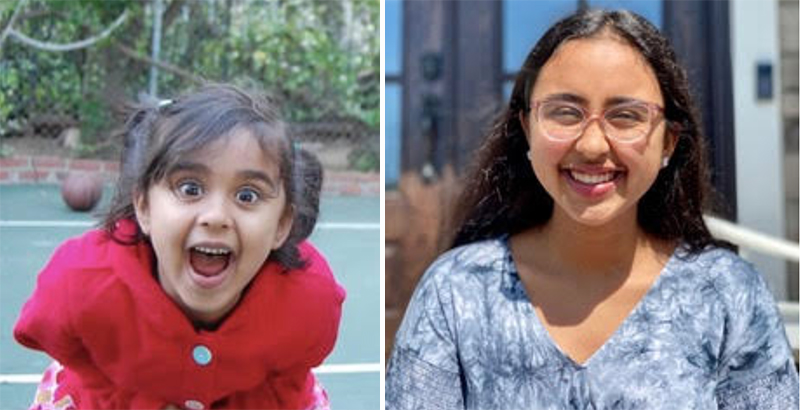Student Voice: Caged In and Zoomed Out, I’m Dreaming of Getting Dirt Under My Fingernails and Learning Again in a Non-Virtual World

From kindergarten through third grade, I attended a nature-based school where I learned math by knitting, read English books in trees and fed goats in science class. We were discouraged from sitting in classrooms, or having any screen time, even at home. Instead, we painted with abandon, wrote and performed our own plays, and built fairy houses out of acorns in the field. Needless to say, we were always dirty. Our education was strung together by the power of our imaginations allowed to roam free. We could make entire worlds, write ourselves into stories and thrum with the magic of our own creativity. No one had told us yet that we couldn’t.
My parents pulled me out of this school after third grade because they felt I wasn’t receiving the education I needed and sent me to the one I attend now, a college-prep private high school, which is academically very rigorous. My current educational environment is one without goats, surrounded by fields without magic. Like most students, I take standardized tests and do chemistry projects. I learn grammar and calculus and conjugate Spanish verbs. We talk about college entrance exams and career goals. All very practical. But despite all that, until several weeks ago, I learned face-to-face with my teachers and fellow students, gossiped with my friends at lunch, played volleyball or did yoga in gym class, and was surrounded by a learning community.
As a 10th-grader living in the hard-hit New York metro area during the COVID-19 crisis, I find that my educational life has changed dramatically. I have been doing all-day online classes and coursework, meant to replicate the experience of being in school. And it is at this time that I can’t help remembering my tactile childhood education and wondering if there aren’t more fruitful and less stressful ways to learn.
Sitting in front of my computer for seven hours a day, constantly going in and out of Zoom video classes, I have found it difficult to actively engage with my academic materials without real-life interaction with my peers, teachers and community. With only my mother and older brother in the house, respectively involved in teaching and learning online, it has been isolating and lonely. The practice of social distancing has helped me realize that active engagement in a learning community is one of the most important aspects of an education. Physical activity, whether doing lab experiments in science, shooting videos for art or solving math problems on a whiteboard, helps make learning real. Engagement in outdoor spaces makes education meaningful, while self-isolation has made my academic life feel caged in. Only a few months ago, in science class, we released monarch butterflies outside, after they hatched in our classroom. Maybe mistaking my bright orange sweater for a flower, one landed on my shoulder for a moment before flying away. I miss those small, beautiful moments of tangible learning.
The COVID-19 crisis has been not only a deterioration of an engaging learning experience but also a time filled with worry and concern. We wash our hands, and we wash them again. We stand six feet apart. We calculate whether leaving the house, even for a walk, is worth the risk. My father is a practicing physician at a major hospital, and although he is not in direct contact with COVID-19 patients, many of his colleagues are sick. Therefore, isolation has been even more anxiety-provoking and scary. I worry for his health, and also for my brother, a high school senior, and whether he will miss out on graduation. I worry for myself whether I will be able to be a good candidate for college with new systems of AP testing and this “lost” semester. Will I be able to perform well on at-home, 45-minute free response AP tests? Will I perform as well in my online classes as I did when we were actually at school?
I realize now that even in my college-prep school, learning emerges from physical togetherness, creative freedom and tangible experience. Education is not only about transferring information from teacher to student but also creating experiences in an environment where students can teach themselves. English class is about the rules of grammar, yes, but also about learning how to think critically in a group of peers, express opinions and listen actively to others. It is not the antiseptic lessons themselves that matter so much as getting our hands dirty in tangible learning. After this crisis is over, is there a way to value the importance of tactile, physical learning even more, realizing that the digital world can never substitute for (metaphorical, virus-free) dirt under our fingernails?
I remember my first-grade playmates and our collective magic. I remember being dirty and playing impractical games. I remember climbing trees and dreaming. These wild memories of another place and time sustain me and remind me that even in these scary months, we can still create the world and educational system we want and need.
“Pandemic Notebook” is an ongoing collection of first-person, student-written articles about what it is like to live through the coronavirus pandemic. Have an idea? Please contact Executive Editor Andrew Brownstein at [email protected].
Get stories like these delivered straight to your inbox. Sign up for The 74 Newsletter

;)